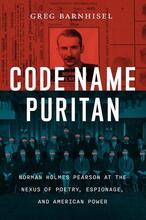
Every part of Norman Holmes Pearson had an unusual shape. He was recalled by one of his English students at Yale as a “black-browed, black-mustached man” with a “grotesquely hunched back.” Yet he taught so well, this former pupil recalled, that most forgot the “deformity” Pearson developed after falling off a roof at the age of 8.
As Greg Barnhisel reveals in Code Name Puritan, a life of the literary scholar and World War II spymaster, most of Pearson’s career, too, was unusual. As a student at Yale in the 1920s and ’30s Pearson fell in love with American literature, at the time still a marginal subject at universities. He never authored a book, but he edited many, including the important 1938 “Oxford Anthology of American Literature,” which made his name in the world of literary studies, and a landmark edition of Nathaniel Hawthorne’s writings. Pearson also boosted the reputations of many American writers, especially Ezra Pound, William Carlos Williams and his close friend Hilda Doolittle—better known by her pen name, H.D.